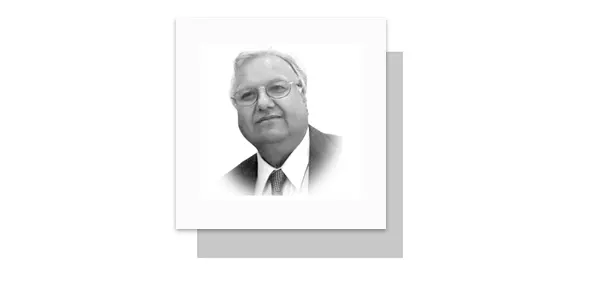SHEIKH Ibrahim Zauq may have remained overshadowed in comparison to Ghalib, but he did compose a verse so endearing that one cannot help but admire it: “If you wish to be remembered, then create means of benefit: Build a bridge, a well… a mosque or a pond.”This verse would not have come to mind had the worthy sons of Khawaja Muhammad Rafiq Shaheed—Khawaja Saad Rafiq and Khawaja Salman Rafiq—not created such means of benefit themselves. Who was Khawaja Muhammad Rafiq? I posed this question to a few journalists today, one of whom is a prominent TV program host and boasts an enviable following on social media. New generation, who proudly identify as “Gen Z,” tend to respond to such questions with puzzled looks and indifferent shrugs, saying, “Strange.”
After experiencing this odd response, I felt disheartened and was reminded of my childhood in a middle-class, landowning family known for its dedication to agriculture, knowledge and skill. My late father, Hakim Ghulam Hussain Adil, an ideological man with a clear political vision, often educated us through meaningful conversations. I recall one winter evening when he returned home, silently reclined on his seat and seemed lost in thought. Concerned, my mother asked if everything was alright. After a pause, trying to contain his emotions, he said, “Today, Khawaja Muhammad Rafiq was martyred.”We were not “Gen Z” to dismiss this with a casual “So what.” Naturally, I asked, “Who is Khawaja Muhammad Rafiq?” In response, my father gave a detailed introduction. While I do not remember all the specifics, I was left with the impression that Khawaja Sahib was a man of character—a political worker and leader who always followed his conscience, strengthening the opposition. My father explained that he was targeted and martyred during a protest for raising his voice against the tyranny of the government of his time.
Respected brother, Malik Muhammad Muazzam, once mentioned that the day of the protest was so intense, with tear gas and bullets fired mercilessly, that even the surrounding buildings near Faisal Chowk (Cheering Cross) were damaged. A tear gas shell had even ripped through the massive billboard of Daily Wafaq. In 1982-83, as a young student, I visited Lahore and specifically went to Shah Din Building to see the four-inch-diameter hole left by the shell. For me, Shah Din Building, the torn billboard, and Faisal Chowk became symbols of Khawaja Muhammad Rafiq, who represented dissent and courageous political resistance.About eight or ten years after his martyrdom, during the student week at Ambala Muslim College, I had the privilege of meeting one of Khawaja Sahib’s sons. Sitting with him and chatting felt like an honor, as he carried the scent of a martyr. It also reminded me of my father, who had instilled in me a clear political perspective and taught me that every struggling political worker deserves respect.
In 1996, during the opposition days of the Pakistan Muslim League-N (PML-N), Nawaz Sharif decided to strengthen his party’s base in Sindh. Late Abdul Hamid Sheikh and some other PML-N workers worked tirelessly during this time, even facing treason charges as a result. During this period, party’s senior leadership toured Sindh and Balochistan, including Makhdoom Javed Hashmi, Raja Nadir Pervez and Khawaja Saad Rafiq. Because of our similar ages, I spent considerable time with Khawaja Saad Rafiq during this tour, which gave us a chance to get to know each other better. I also mentioned his participation in the Ambala Muslim College debate, which he confirmed.December 20 marks the martyrdom anniversary of Khawaja Muhammad Rafiq. Every year, his sons organize an event on this occasion, which has become a tradition for political workers to gather and discuss national issues. This gathering resonates with Sheikh Ibrahim Zauq’s verse. After all, bridges, wells, mosques and ponds are not the only sources of benefit—gatherings that ignite thought and foster broader consultation serve the same purpose. By turning their father’s death anniversary into a forum for political discourse, the Khawaja brothers have created a form of ongoing charity that not only benefits the martyr’s soul but also ensures their continued adherence to the righteous path, contributing to the nation’s welfare.
This year’s commemorative event will particularly stand out in our current political climate, as it brought forward some proposals for resolving national issues. If implemented, these suggestions could address many challenges plaguing our political landscape. Rana Sanaullah suggested direct negotiations between Nawaz Sharif, Asif Ali Zardari, and Imran Khan. He asserted that such talks could resolve not only the past seventy years of issues but also those of the next seventy years.This proposal stemmed from Khawaja Saad Rafiq’s earlier suggestion for senior political leaders, including Maulana Fazlur Rehman, Hafiz Naeem-ur-Rehman, Shahid Khaqan Abbasi and others, to engage in dialogue. In our current political environment, Rana Sahib’s suggestion marks a significant leap forward. If this proposal is acted upon, it would undoubtedly be a breakthrough. It indicates not only that the PML-N now recognizes the PTI as a political reality but also Nawaz Sharif’s willingness for grand negotiations. If Imran Khan shows wisdom and agrees to this, Pakistan may finally find a way out of its myriad problems, God willing.
—This writer is former advisor to the president of Pakistan, author & mass media theorist.
(farooq.adilbhuta@gmail,com)










